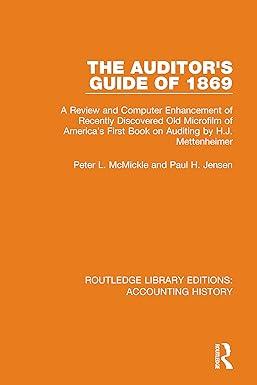Question
Hi, i have 2 cases and would be really appreciate if you can help me to answer it, the first case is already answered and
Hi, i have 2 cases and would be really appreciate if you can help me to answer it, the first case is already answered and i am wondering is it gonna be same answer with the second case because in first case says Wesfarmers notes that the functional currency and presentation currency of Wesfarmers Ltd and its Australian subsidiaries are the Australian dollar while in the second case it says Wesfarmers lists its overseas subsidiaries and their functional currencies which didnt mention presentation currency in it, and can you please give me the reason in it? thank you!
case 1
In its 2011 annual report (p. 98) Wesfarmers notes that the functional currency and
presentation currency of Wesfarmers Ltd and its Australian subsidiaries are the
Australian dollar. In Note 32 it lists its overseas subsidiaries and their functional
currencies. These include Bunnings (NZ) Ltd for which the functional currency is the
New Zealand dollar (NZD), and Wesfarmers Kleenheat Elpiji Ltd for which the
functional currency is the Bangladesh taka (BDT).
Required
Discuss the translation process that will occur so that these subsidiaries can be included
in the consolidated financial statements of Wesfarmers Ltd.
The foreign operations are being prepared in their functional currencies, generally the
currency of the country in which the country operates e.g. NZ or Bangladesh.
In order to include the financial statements prepared in a functional currency other than the
A$, they must be translated into the presentation currency of A$. This process involves the
following translation process:
Assets: Rates of exchange at balance date (current rates) are used
Liabilities: Rates of exchange at balance date (current rates) are used
Share capital: If on hand at acquisition date, the rate at acquisition date is used
Other reserves: If on hand at acquisition date, the rate at that date is used. For reserves
created by internal transfer, the rate at the date the amounts transferred were originally
recognised in equity is used.
Retained earnings: If on hand at acquisition date, the rate at that date is used. Post-acquisition
profits are carried forward balances.
Revenues/expenses: Rates approximating the foreign exchange rates at the dates of the
transactions are used - probably an average rate is used.
Under this translation method, exchange differences arise because the opening net assets are
translated at a rate different from the closing rate while revenues/expenses are translated at
rates different from the closing rate. These exchange differences are not recognised in profit
or loss. They are recognised in other comprehensive income and transferred to a foreign
currency translation reserve account.
case 2
In its 2017 annual report (note 19) Wesfarmers lists its overseas subsidiaries and their functional currencies. These include Bunnings (NZ) Ltd for which the functional currency is the New Zealand dollar (NZD), and KAS Global Trading Pty Ltd for which the functional currency is the Hong Kong dollar (HK$).
Required
What is meant by 'functional currency'? How is it determined?
Discuss the translation process that will occur so that these subsidiaries can be included in the consolidated financial statements of Wesfarmers Ltd.
Step by Step Solution
There are 3 Steps involved in it
Step: 1

Get Instant Access to Expert-Tailored Solutions
See step-by-step solutions with expert insights and AI powered tools for academic success
Step: 2

Step: 3

Ace Your Homework with AI
Get the answers you need in no time with our AI-driven, step-by-step assistance
Get Started


